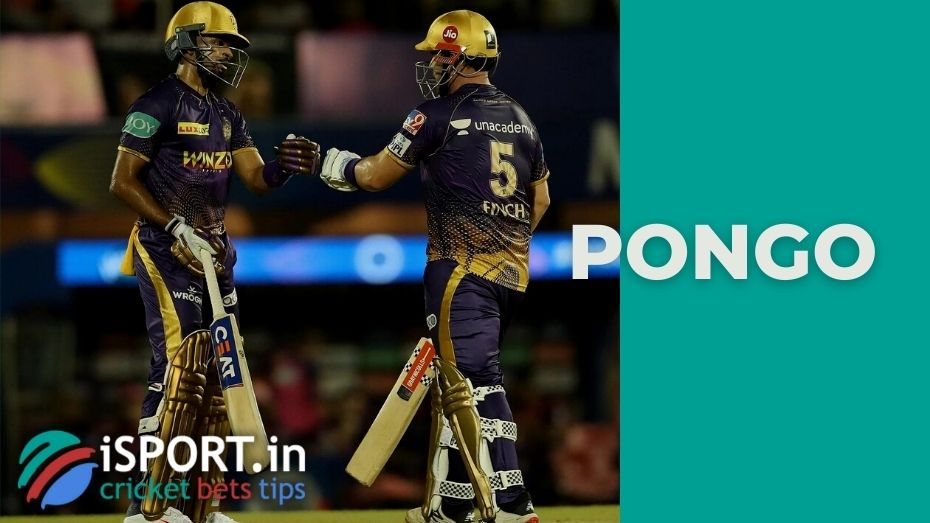Pongo

Pongo is a specific term in cricket for a fast batsman with an aggressive style of play and is used primarily in the English County Championship.
The main goal of the batsman, regardless of the format in which he is performing, is to get the maximum number of runs. This seemingly straightforward task is not that easy, as the batsman must consider many factors, from the playing style of the opposing bowler to the characteristics of the pitch. In addition, the batsman must have a good technical arsenal and excellent knowledge of the rules and maintain an optimal balance of aggression and caution to avoid getting out.
The term pongo is often used to refer to limited-overs players. So, if in test matches the players can take their time, focusing primarily on protecting the wicket, then in ODI and T20, gaining the maximum possible number of points in the shortest possible time comes to the fore (the benchmark is at least one wound per ball served by a bowler ). Batsmen are forced to develop a high speed to achieve this goal, reaching record values towards the end of the match when the batting team seeks to close the score gap or build an advantage. The only exception is a batsman chasing a personal best, for example, century: when there is a real opportunity to improve his stats, he is more likely to be careful not to get out of touch.
The lists of the best pongo are regularly updated, which is primarily due to the peculiarities of the format. And although T20 began to gain popularity relatively recently, there are already several pongo names that have managed to be noted for high results in home leagues and at international tournaments. When compiling the rating, such criteria as the total number of executed runs (from 2000), an average of 29.08 and an SR (Strike rate) of at least 128.83 are taken into account.
- Quinton de Kock (South Africa). The star of the Highveld Lions, he boasts an impressive 132.92 T20 average. Even though the start of his career cannot be called bright, the talent of the young batsman was quickly noticed not only at home but also in the Indian Premier League.
- Kieron Pollard (West Indies). It is not for nothing that Pollard is considered one of the most outstanding batsmen of his generation, capable of rivaling Chris Gale in the future. He gained public attention back in 2009, completing 54 runs on 18 goals in a Champions League match against the New South Wales Blues. An average of 153.75 makes him one of the fastest and most aggressive Pongos of our time. It is noteworthy that Pollard is equally confident in different pitches and has already proved himself excellently in the Indian Premier League (in particular, he managed to complete 60 runs for 32 goals in 2013 final). Unlike many of his colleagues, Kieron is also quite good as a fielder.
- David Warner (Australia). One of the best pongo destroyers of our day, David managed to raise his indicators to 141.18. He is famous not only for his high speed but also for the accuracy of his blow: for example, speaking for New South Wales in the 2011 Champions League, he issued two hundred in a row, which helped the team break into the semifinals of the competition.
- Andrew Symonds (Australia). The Birmingham native Symonds has played for Australia and, while his career is far from perfect, he did well, averaging 147.35 per 100 goals. He was deservedly considered one of the toughest and most aggressive pongo of his generation, capable of taking risks in the most difficult situations. One of Andrew’s most striking performances was his debut season in the Indian Premier League, where in the match against the Rajasthan Royals, he scored 117 runs for 63 goals, beating several really powerful opponents, including Shane Warne.
- Brad Hodge (Australia). Even though Hodge is better known as an effective trap, he also boasts a good average (139.71). The Aussie’s cold-blooded approach and precision have saved his team many times in the IPL, with one of his most memorable appearances in 2013, in which the Rajasthan Royals knocked out the runner-up Sunrisers Hyderabad.
- Suresh Raina (India). Raina is the type of player who did not perform well in test matches but managed to find himself in the limited-overs format. In particular, the Indian became the first representative of his country to score a hundred in T20 and showed good results, speaking for the Chennai Super Kings (141.96). Since joining the team in 2008, he has never missed a match, and some of his innings are still considered exemplary.
- Mahendra Singh Dhoni (India). Even though Dhoni never aspired to the first roles, calmly letting his comrades ahead in the lists of batsmen, over the years of active performances, he managed to acquire quite impressive statistics – 136.59. Mahendra Singh is famous for his aggressiveness and ability to end the most difficult match episodes in his favor.
- Shaun Marsh (Australia). The winner of the Orange Cup, Marsh, is nowhere near the top of the pongos list. However, this is the same case where it is almost impossible to get a good idea of the batsman’s performance from numbers alone. Having received an invitation from the Kings XI Punjab, he completed 616 runs in eleven matches in the first season, effectively dragging his team to the final. And although his talent was not noticed for a long time at home, Sean continued to progress, spending another season at the highest level (504 wounds in 14 games).
- David Miller (South Africa). Miller (not to be confused with his full namesake from England, who also played as a wicket-keeper) is Marsh’s team-mate, who formed a killer bond with Glenn Maxwell. This gifted pongo is deservedly considered a thunderstorm for outfield players, as evidenced by his statistics – 139.65 per 100 goals.
- Chris Gale (West Indies). One of the most versatile batsmen of our time, Gale has the rare ability to quickly change pace during a match, adjusting to his opponent and exploiting his weaknesses. As a result, an impressive statistic of 146.66 per over plus 175 note-outs was recorded during the player’s performance in the Royal Challengers Bangalore (Indian Premier League).
It is interesting: in one of the alternative lists of the best pongos of all time, the top 5 are opened by the same Chris Gale (175 runs in the Royal Challengers Bangalore match against Pune Warriors India), Aaron Finch (172 runs in the Australia national team match against Zimbabwe), Hamilton Masakadza and Hazratullah Zazai, tied for third with 162 runs, and Adam Leet (161 runs in Yorkshire v Northamptonshire).
